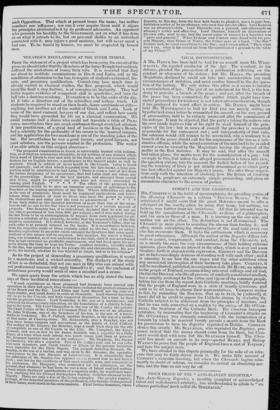COBBET T AND THE CHRONICLE.
M. COBBETT is in the habit of apostrophizing the presiding genius of the Moming Chronicle as a certain " DOCTOR BLAcK." To the uninitiated it might seem that the great Reformer meant to affix a sobriquet on the worthy editor by using that term ; but nothing, we believe, was further from his intentions. All that he intended was to hold up the speculations of the Chronicle as.those of a philosopher, and his own as those of a man. It is learning on the one side, and mother wit on the other. The distinction is not ill conceived. The Chronicle is more given to sounding the stream than fording it; and often stands calculating the obstructions of the road until every one else has overcome them. It lacks the enthusiasm which is necessary to great enterprises. Although the author of the Register differs toto ccelo in genius, temperament, and conduct, from the Chronicle, yet, as is mostly the case, the very circumstance of their holding extreme opinions, gives the one an interest in the other, which is ever and anon breaking forth in characteristic expression. COBBETT and the DOcTOR are in fact exceedingly desirous of standing well with each other ; and it is amusing to see how the one rages and the other subtilizes when any occasional interruption of their harmony take place. CORBETT, it will be recollected, published, in conjunction with Mr.HuNT, an address to the people of England, recommending universal suffrage and all that. On this the Do CTOR,. who like all persons of similarly constituted intellect, has a mighty contempt for the virtue and vigour of the common people, taking his cue from the recent Anti-Catholic meetings, boldly declared that the people of England were in a state of beastly ignorance, and unfit to be let loose to choose their representatives. COBBETT replies to this, by reminding the DOCTOR, that up to 1825, he (indirectly at least) did all he could to oppose the Catholic claims, by declaring the Catholic religion to be abhorrent from the principles of freedom, and that he was only converted on a sudden by the arrivai of Mr. O'CoN- NELL, the treasurer of the Catholic Rent. The ;.)ocTou hereupon retaliates, by insinuating that the beginning of COBBETT"S attacks on Mr. O'CONNELL was strangely coincident with the termination of a bargain by which he received twenty pounds a month from the Rent for permission to have his Register reprinted in Dublin. COBBETT denies this stoutly : Mr. STAUNTON, who reprinted the Register, pro- posed indeed that the money should come from the Rent, but Con- BETT would deal with none but Mr. STAUNTON himself. The Chro- nicle has made an mode in its way—quoted BURKE and Bishop WATSON to prove that the people of England have a cast of Toryism ; and here the subject rests.
We have alluded to this dispute principally for the sake of an infer- ence that may be fairly drawn from it. We make little account of
COBBETT"s sanguine boasting, but when the Chronicle begins vehe- mently to doubt of reform, we consider its arrival as absolutely cer- tain, and the time as not very far off.


















 Previous page
Previous page